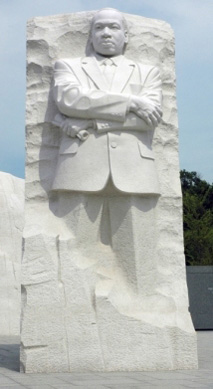Ford in the Community
Ford in the CommunityFord Helps Honor Dr. Martin Luther King, Jr. with National Memorial
The dream of Dr. Martin Luther King, Jr. stands tall in the hearts and minds of Americans in all walks of life. Now, a granite likeness of Dr. King – a man of hope and peace - stands tall on the National Mall in Washington, D.C. as an inspiration to people of all races and nationalities.

“We dedicate this Memorial to Dr. King with great pride," said Harry E. Johnson, Sr., president and CEO of the MLK Memorial Foundation. "Dr. King, his life, his dream, and his legacy, will be a source of history and inspiration for all people, for all time.”
Ford Motor Company Fund is a Leadership Donor and contributed $2 million toward the construction of the memorial, a 30-foot sculpture of Dr. King. The memorial occupies the last open space on the National Mall and is adjacent to the Franklin Delano Roosevelt Memorial and near the Jefferson and Lincoln Memorials. The King Memorial covers four acres and includes a 450-foot, crescent-shaped wall inscribed with 14 of his most notable quotations. It is the first memorial on the National Mall honoring a man of color.
"Dr. King's timeless message of peace, love and understanding resonates in the hearts of all people who dream of a better world," said Jim Vella, president, Ford Motor Company Fund and Community Services. "Ford is proud to play a role in honoring Dr. King and helping to keep his dream alive for future generations."
Ford has a rich history of supporting initiatives and institutions that advance diversity and celebrate our collective heritage. Ford Motor Company Fund was a major contributor to the National Civil Rights Museum, located at the Lorraine Motel in Memphis, Tennessee, where Dr. King was assassinated. Ford also sponsors Freedom's Sisters, a Smithsonian traveling exhibition dedicated to African American women who fought for equality, and the Ford Freedom Awards, which honors the contributions and legacy of African Americans at an annual ceremony at the Charles H. Wright Museum of African American History in Detroit.
Ford Motor Company Fund & Community Services

2010 / 2011 Drive Community Report
View our annual report to learn more about our philanthropic and service work around the globe.





Connect with Ford
Ford in the Community on Facebook
Ford Community on Flickr
Ford Community on YouTube